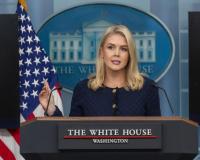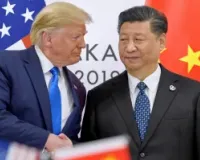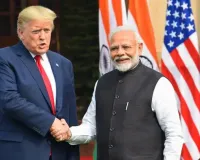Pak-Afghan deteriorating relation: From being viewed in a tea cup to an ethnic narrative

The optics were politically explosive; to some it signalled successful diplomatic engagement, to others it looked like an improvised handshake that opened doors to unintended consequences. Referring to the incident, Pakistan's Deputy Prime Minister Ishaq Dar recently blamed the Imran Khan-led Pakistan Tehreek-e-Insaf (PTI) government for worsening ties with Afghanistan, said reports. In his recent address to the Senate, Dar, who is also the country’s Foreign Minister, opined that the “cup of tea” in Kabul had proved costly for Islamabad.
Media reports have also quoted other senior government figures, including Defence Minister Khwaja Asif, and Pakistan's ruling party spokespersons having echoed similar lines that Hameed's 2021 Kabul meeting was a strategic error. The issue has meanwhile evolved into an ethnic narrative which paints a local canvas of Pakistan's Punjabi-dominated political leadership and military elite versus a Pashtun Taliban, with Imran Khan's Pashtun roots invoked as evidence of his sympathy for Pashtun militants.
Ethnic identities are politically salient and have shaped perceptions in Pakistan. Such identities play a background role in shaping perceptions and political narratives, including about Imran Khan. And now, it is being considered among causes for Islamabad’s current fallout with the Afghan Taliban. However, it can not be perceived as the only -- or even the principal -- reason for Islamabad's fallout with the Afghan Taliban. Pakistan's relationship with Afghan militant groups has long been transactional and state-driven. During the Soviet occupation, the ISI raised the Mujaheddin militia, with covert assistance from US Central Intelligence Agency (CIA).
The Taliban, TTP, are said to be their offshoots. Post-Soviet era, Pakistan's security establishment supported the Afghan Taliban as a strategic shortcut to influence in Kabul and to counter any regional players. After 9/11, and the elimination of Osama bin Laden on its territory, Pakistan publicly shifted under international pressure but continued to balance ties with Afghan actors for strategic depth, intelligence leverage, and cross‑border influence. In August 2021, the fall of Kabul re-opened old dilemmas -- should Islamabad normalise relations with the Afghan Taliban, or use military power to push Kabul to restrain anti‑Pakistan groups such as the Tehreek-e-Taliban Pakistan (TTP), and Balochistan Liberation Army (BLA), among others?
Pakistani officials say that the number of militants returning across the border and the scale of cross‑border attacks rose substantially after 2021, citing figures and incidents that fed the sense of strategic regret over early outreach. Against that backdrop, the photo of a senior Pakistani intelligence chief casually meeting Taliban leaders came to be re-run and be viewed not as diplomatic realpolitik but as the moment Pakistan allegedly ceded leverage that it could need to curb alleged militant transit and sanctuaries.
For many critics of the Imran Khan era, Faiz Hameed's visit epitomised an operational choice taken by elements of the security bureaucracy that privileged rapid engagement with the new Afghan rulers, apparently without sufficient safeguards to prevent militant spillover. Thus arose competing narratives, with one painting the visit as a miscalculated opening that worsened Pakistan’s security, while the other portraying it as necessary realpolitik that was later blamed for consequences beyond what any single meeting could cause.
About The Author
Welcome to Aryan Age, an English newspaper that has been serving readers since 2011 from Delhi. With a loyal circulation of over 19,000, we are dedicated to providing our readers with the latest news and information, as well as insightful analysis and commentary that help them navigate the complex and rapidly changing world.











Comment List